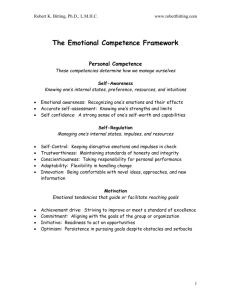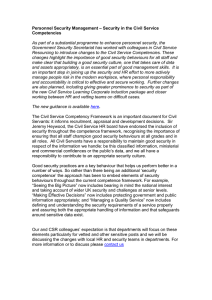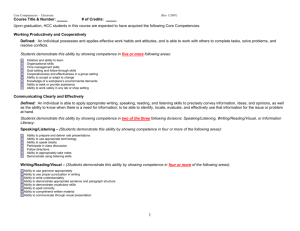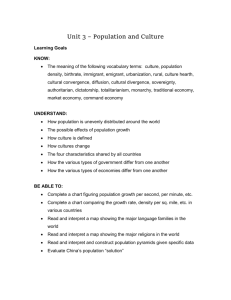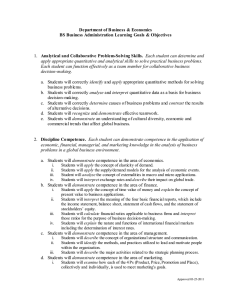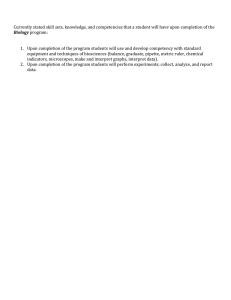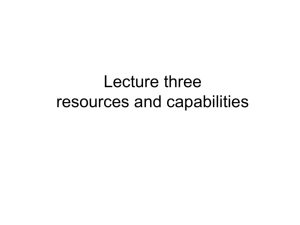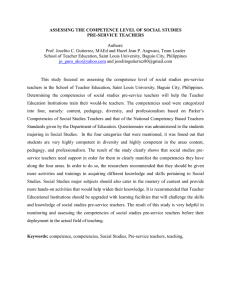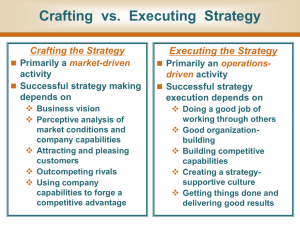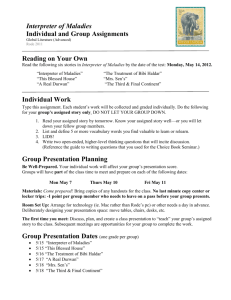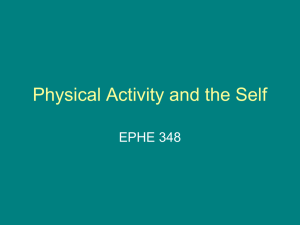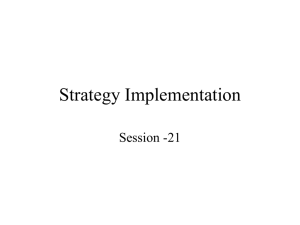Seven Domains of Competence
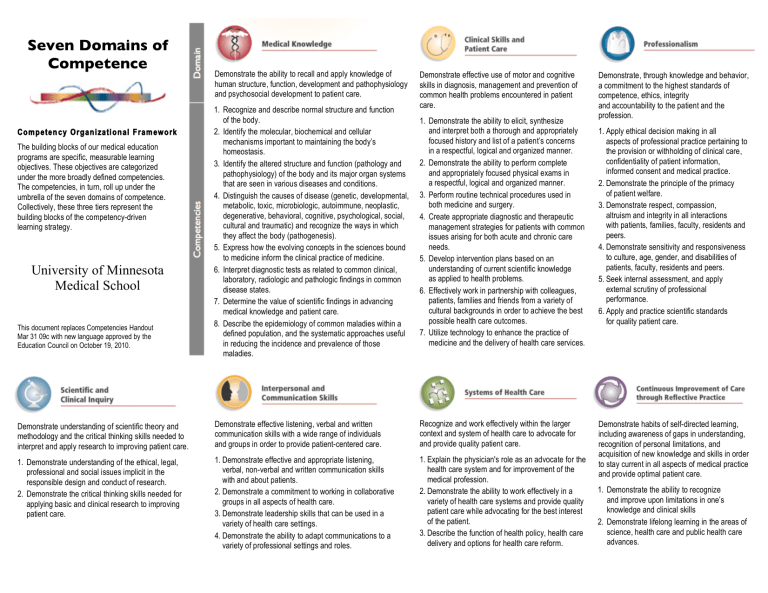
Seven Domains of
Competence
Competen cy Organizational Framework
The building blocks of our medical education programs are specific, measurable learning objectives. These objectives are categorized under the more broadly defined competencies.
The competencies, in turn, roll up under the umbrella of the seven domains of competence.
Collectively, these three tiers represent the building blocks of the competency-driven learning strategy.
University of Minnesota
Medical School
This document replaces Competencies Handout
Mar 31 09c with new language approved by the
Education Council on October 19, 2010.
Demonstrate the ability to recall and apply knowledge of human structure, function, development and pathophysiology and psychosocial development to patient care.
1.
Recognize and describe normal structure and function of the body.
2.
Identify the molecular, biochemical and cellular mechanisms important to maintaining the body’s homeostasis.
3.
Identify the altered structure and function (pathology and pathophysiology) of the body and its major organ systems that are seen in various diseases and conditions.
4.
Distinguish the causes of disease (genetic, developmental, metabolic, toxic, microbiologic, autoimmune, neoplastic, degenerative, behavioral, cognitive, psychological, social, cultural and traumatic) and recognize the ways in which they affect the body (pathogenesis).
5.
Express how the evolving concepts in the sciences bound to medicine inform the clinical practice of medicine.
6.
Interpret diagnostic tests as related to common clinical, laboratory, radiologic and pathologic findings in common disease states.
7.
Determine the value of scientific findings in advancing medical knowledge and patient care.
8.
Describe the epidemiology of common maladies within a defined population, and the systematic approaches useful in reducing the incidence and prevalence of those maladies.
Demonstrate effective use of motor and cognitive skills in diagnosis, management and prevention of common health problems encountered in patient care.
1.
Demonstrate the ability to elicit, synthesize and interpret both a thorough and appropriately focused history and list of a patient’s concerns in a respectful, logical and organized manner.
2.
Demonstrate the ability to perform complete and appropriately focused physical exams in a respectful, logical and organized manner.
3.
Perform routine technical procedures used in both medicine and surgery.
4.
Create appropriate diagnostic and therapeutic management strategies for patients with common issues arising for both acute and chronic care needs.
5.
Develop intervention plans based on an understanding of current scientific knowledge as applied to health problems.
6.
Effectively work in partnership with colleagues, patients, families and friends from a variety of cultural backgrounds in order to achieve the best possible health care outcomes.
7.
Utilize technology to enhance the practice of medicine and the delivery of health care services.
Demonstrate, through knowledge and behavior, a commitment to the highest standards of competence, ethics, integrity and accountability to the patient and the profession.
1.
Apply ethical decision making in all aspects of professional practice pertaining to the provision or withholding of clinical care, confidentiality of patient information, informed consent and medical practice.
2.
Demonstrate the principle of the primacy of patient welfare.
3.
Demonstrate respect, compassion, altruism and integrity in all interactions with patients, families, faculty, residents and peers.
4.
Demonstrate sensitivity and responsiveness to culture, age, gender, and disabilities of patients, faculty, residents and peers.
5.
Seek internal assessment, and apply external scrutiny of professional performance.
6.
Apply and practice scientific standards for quality patient care.
Demonstrate understanding of scientific theory and methodology and the critical thinking skills needed to interpret and apply research to improving patient care.
1.
Demonstrate understanding of the ethical, legal, professional and social issues implicit in the responsible design and conduct of research.
2.
Demonstrate the critical thinking skills needed for applying basic and clinical research to improving patient care.
Demonstrate effective listening, verbal and written communication skills with a wide range of individuals and groups in order to provide patient-centered care.
1.
Demonstrate effective and appropriate listening, verbal, non-verbal and written communication skills with and about patients.
2.
Demonstrate a commitment to working in collaborative groups in all aspects of health care.
3.
Demonstrate leadership skills that can be used in a variety of health care settings.
4.
Demonstrate the ability to adapt communications to a variety of professional settings and roles.
Recognize and work effectively within the larger context and system of health care to advocate for and provide quality patient care.
1.
Explain the physician's role as an advocate for the health care system and for improvement of the medical profession.
2.
Demonstrate the ability to work effectively in a variety of health care systems and provide quality patient care while advocating for the best interest of the patient.
3.
Describe the function of health policy, health care delivery and options for health care reform.
Demonstrate habits of self-directed learning, including awareness of gaps in understanding, recognition of personal limitations, and acquisition of new knowledge and skills in order to stay current in all aspects of medical practice and provide optimal patient care.
1.
Demonstrate the ability to recognize and improve upon limitations in one’s knowledge and clinical skills
2.
Demonstrate lifelong learning in the areas of science, health care and public health care advances.


